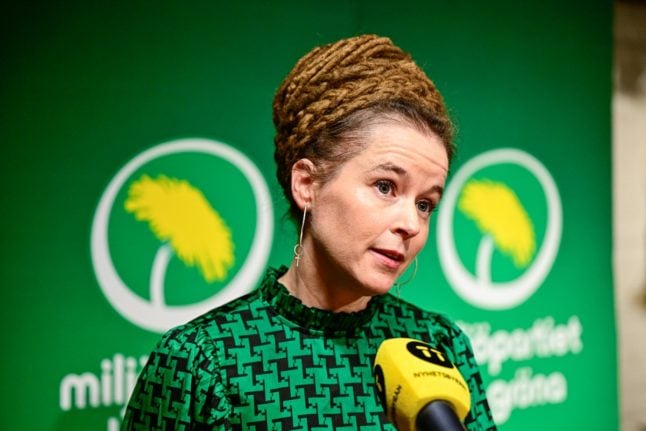Hej and welcome to Politics in Sweden, our renamed weekly column, which used to be known as Sweden Elects. This is for members of The Local only, so thank you for supporting our journalism.
This morning I read an interesting interview with the CEO of the Swedish Association of Industrial Employers (Industriarbetsgivarna), an organisation that supports employers in some of Sweden’s top industries, such as sawmills, steel, metal, mining and welding.
First, to recap, last week it was announced that Europe’s largest deposit of rare earth metals had been discovered in northern Sweden, which grabbed global headlines.
Conveniently, it happened to be announced at a visit by the Swedish government and the European Commission to Kiruna, and it was cheered as the next step of Sweden’s green tech boom.
The find is believed to contain at least one million tonnes of rare earth oxides and could produce vital materials used for electric cars in the future.
It also feeds into Sweden’s aim to be a world leader in green technology, a race in which many of the country’s firms are trying to position themselves as frontrunners.
There’s of course Northvolt’s giant factory in Skellefteå, but other northern Swedish cities also boast green steel efforts, including Luleå, Gällivare, Boden and Kiruna.
But Per Hidesten, the head of the Swedish Association of Industrial Employers, told Swedish news agency TT in an interview that there’s not enough talent in Sweden to meet the need for skilled workers. The basic industries alone in the north need 11,000 people, he said.
The government’s plans to raise the salary threshold for non-EU work permit applicants won’t help. The exact figure hasn’t been announced, but the government and its Sweden Democrat allies have floated 33,000 kronor, the average monthly salary.
Everyone from welders to engineers are needed in the green tech boom, and around 75 percent of the needed staff earn less than 33,000 kronor, according to Hidesten, who told TT that “political decisions have to be made. I don’t know if things are moving too fast for the politicians, that they’re not keeping up”.
The decision to raise the salary threshold was put forward by the former Social Democrat government, who are also calling for the reintroduction of labour market tests for work permits, meaning that work permits would only be granted for jobs in sectors experiencing a shortage – a proposal Hidesten argues would add insult to injury.
The tougher laws for labour migrants come during a wave of Sweden getting stricter on immigrants in general, with several new policies targeting mainly asylum applicants.
“Unfortunately I think they’re getting things mixed up,” said Hidesten.
In other news
The Swedish government last week condemned a Kurdish group in Stockholm for hanging an effigy of Turkish President Recep Tayyip Erdoğan showing him dangling by his legs from a rope.
Turkey responded to the mock execution by cancelling the Swedish parliamentary speaker’s trip to Ankara to win support for Sweden’s Nato application.
“We take an incredibly serious view of these events,” read an official statement from Foreign Minister Tobias Billström calling the act “shameless” and “reprehensible”.
The unusually tough language suggests to me that the statement was less directed at the group responsible and more aimed at smoothing things over with Turkey’s leadership.
Also in the news this week is that former Swedish Prime Minister Stefan Löfven has started his own business together with his wife, Ulla, public broadcaster SVT and Dagens Opinion report. The business is called Sorvage AB, like the village of Sörvåge where the couple own a summer house.
It will reportedly focus on “consultancy in the fields of lectures; business, organisational and business development; as well as owning and managing securities”.
And on this week’s episode of The Local’s Sweden in Focus podcast, we talk about the King’s succession grudge, migration law changes, UK citizens expelled post-Brexit, money-saving tips, and why it’s a good year for public holidays. We also interview the Indian ambassador to Sweden and test our panellists’ knowledge of Gothenburg.
What’s next?
Kristersson is heading to Strasbourg on Tuesday, where he is set to present Sweden’s six-month EU presidency at the European Parliament. Here are the top priorities.
On Wednesday the party leaders will debate each other in the Swedish parliament, the first such debate of 2023. The debate is meant to give the leaders of Sweden’s eight parties the chance to argue in favour of their policies. A simultaneous interpretation of the debate will be provided in English via the parliament’s website. Read more here.
Politics in Sweden is a weekly column by Editor Emma Löfgren looking at the big talking points and issues in Swedish politics. Members of The Local Sweden can sign up to receive an email alert when the column is published. Just click on this “newsletters” option or visit the menu bar.



 Please whitelist us to continue reading.
Please whitelist us to continue reading.
We’re all going to die from over heating – and soon – without all these people who are here to save us by supporting the Green Tech Boom. Please come and save us.